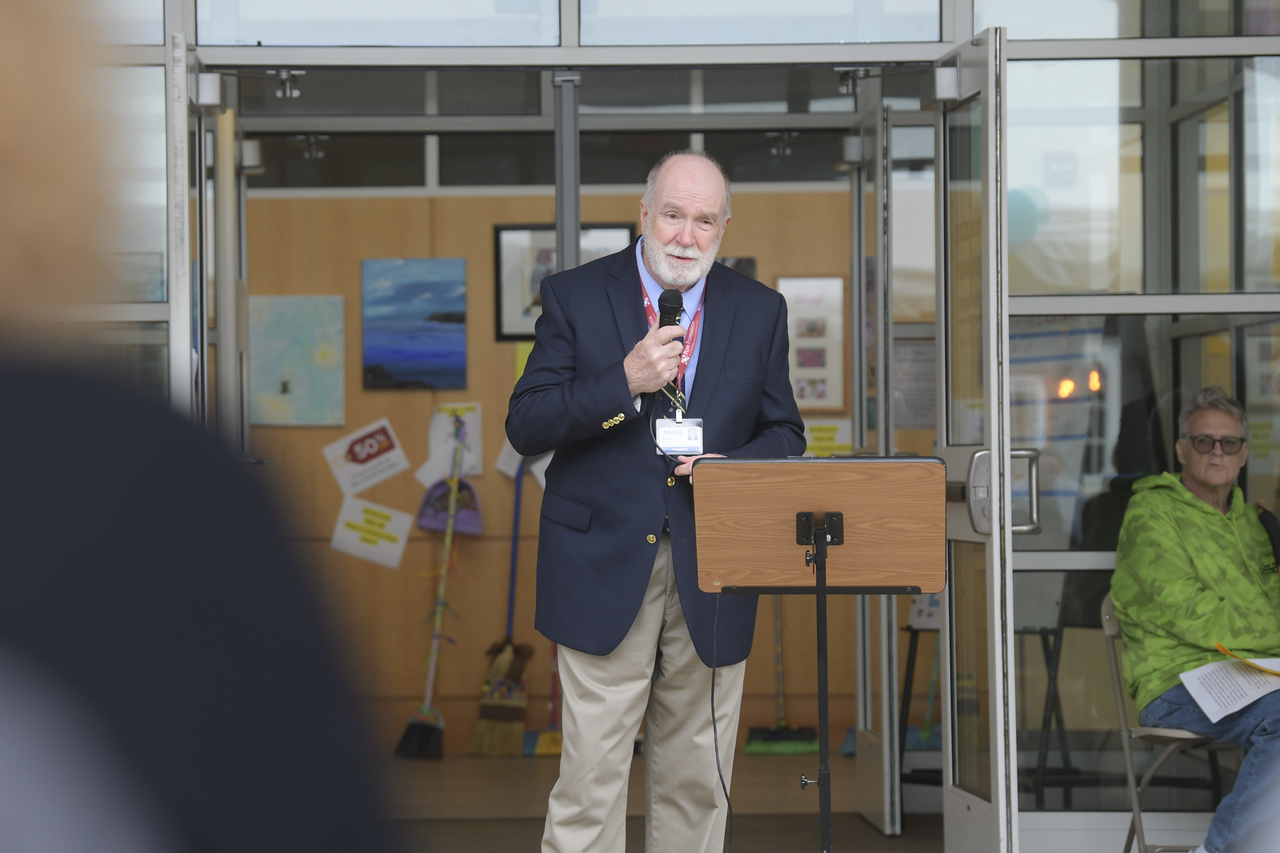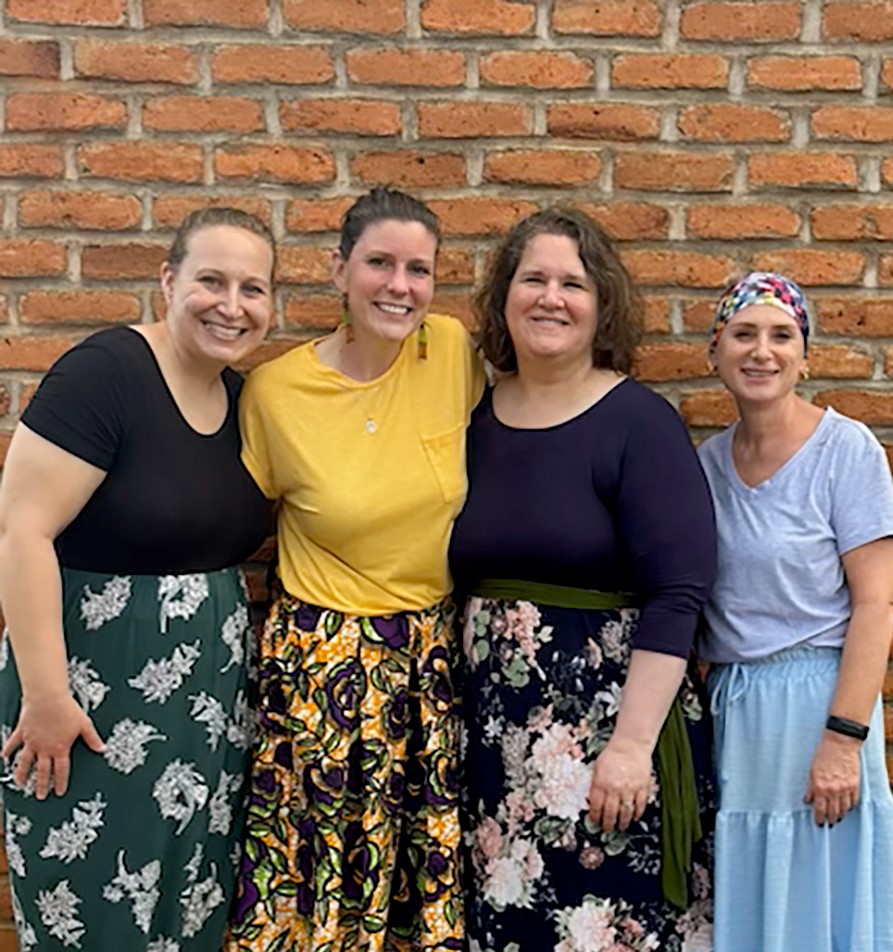For 30 Years Wellspring Clubhouse Empowers Individuals With Mental Illness
May 16, 2024

Wayne A. Mugrauer, President, St. Luke's Penn Foundation, speaks at the anniversary celebration / open house in April.
Wellspring Clubhouse, a program of St. Luke's Penn Foundation, epitomizes the vision that Penn Foundation’s founding medical director Dr. Norman Loux had when he envisioned mental health services for the community in the community.
Located in Sellersville, the Clubhouse is a voluntary social, educational and vocational rehabilitation program for adults living with mental illness that is based on the original “Clubhouse Model” founded by Fountain House in New York City in 1948.
“For 30 years, Wellspring Clubhouse has enabled individuals living with mental illness to remain in and be contributing members of their community. With its support, these individuals have defied the stigma and limitations unfairly associated with mental illness and have gone back to school, to work, to volunteer and more,” says Jocelyn Giancola, Wellspring Clubhouse Program Manager.
“It has given their lives meaning, which in turn, makes our community healthier. The Clubhouse offers these individuals a special place where they are always welcome, where they are appreciated, where they are more than their illness and where they are never alone!”
To mark its 30th anniversary, Wellspring Clubhouse celebrated with the community at large during an open house in April. The celebration included food made by its Health and Wellness Unit, tours of the Clubhouse, member stories, a choir performance, a lot of fun and an overflow of pride.
A vision realized
Wellspring Clubhouse was developed by Penn Foundation's Continuing Care team over several years in the 1980s, when they recognized that:
- Many adults were achieving psychiatric stability;
- There was a need for programs to address the social, educational and vocational needs of adults with mental illness living in the community; and
- Families were expressing a desire for more challenging and interesting programs for their loved ones that could lead to longer community integration and tenure and give them access to competitive employment.
However, at the time, there was very little funding available for social rehabilitation, so the team implemented pieces of what would later become integrated to help form Wellspring Clubhouse, such as a breakfast program, a resource library, two social clubs, a stationary store and a newsletter.
The team began fundraising and built up funds over a period of eight years. In 1992, it received a grant from The Pew Charitable Trusts to help establish a Fountain House model Clubhouse. The planning committee composed of Clubhouse Director Lu Mauro and five members began planning and implementing the grant objectives, including finding the Clubhouse a home.
The team was able to renew this grant seven times due to meeting and exceeding grant objectives. Therefore, for 14 of its 30 years, The Pew Trust funded Wellspring Clubhouse, only stopping once the Clubhouse achieved sustainable funding through Magellan Behavioral Health and increases in funding from both Bucks and Montogomery counties.
During that time, it also found its original and current locations.
“Wellspring Clubhouse started out in a two-story farmhouse but outgrew it. We moved into our current home in Sellersville in 2008 and have been here ever since,” Giancola notes.
Mauro explains that for the program to succeed, it needed to:
- Find champions who wholeheartedly believe in the ability of individuals recovering from psychiatric diagnoses to learn, flourish and contribute to their communities like everyone else and believe that they are deserving of respect and dignity.
- Collaborate with others in every direction to overcome mental illness stigma to provide opportunities for these individuals to participate fully in their community.
- Believe in the value of meaningful employment as one of the most important avenues for community inclusion, independence and recovery, and educational achievement as a means to advance one’s earning power and achieve career goals.
- Hire staff that “get” what Wellspring Clubhouse is doing and share the same beliefs and values.
“At Wellspring Clubhouse, we believe in people, the environment is welcoming and uplifting, and it is voluntary. We believe that by focusing on individuals' unique strengths and talents instead of their diagnoses and symptoms and valuing their partnership in the actual operation of the Clubhouse, people will grow in confidence and tell you about themselves, their goals and their dreams. The person is in the driver’s seat,” Mauro says.
Supporting and empowering members
Wellspring Clubhouse’s members – who Giancola calls “the Clubhouse’s literal heartbeat” – are from Bucks and Montgomery counties. Typically, members are referred to the Clubhouse by various practitioners, family, friends, therapists, word of mouth or self-referral both within and outside of the agency.
Wellspring is an accredited Clubhouse, meaning that it follows the 37 standards that are used to assess the quality of the Clubhouse for members. An example is that “Members choose the way they utilize the Clubhouse, and the staff with whom they work.”
“There are no agreements, contracts, schedules or rules intended to enforce participation of members. Members participate in what is referred to as the Work Ordered Day, which parallels typical working hours and is designed to help members regain self-worth, purpose and confidence, but it is not job-specific training. The Clubhouse focuses on the strengths, talents and abilities of its members,” Giancola says.
While there are no agreements, contracts, schedules or rules intended to enforce participation of members, there is a framework. Wellspring Clubhouse does have four guarantees:
- The right to meaningful relationships;
- The right to a place to come;
- The right to meaningful work; and
- The right to a place to return.
And the 37 International Standards for Clubhouse Programs established by Clubhouse International help directors and staff constantly evaluate themselves and identify how they can do better as a quality assurance process.
A large section of the standards address employment, which lays out benchmarks for all accredited Clubhouses to follow.
“There is a strong emphasis on work because working not only increases self-esteem, confidence, and opportunities to learn new skills, it gives members meaning and purpose,” she says.
“The intentionality behind the Clubhouse model and the standards is that work is the therapeutic intervention that is a mechanism for members to rehabilitate in a way that was not traditionally offered.”
To that end, members actively help run the Clubhouse. In fact, they work side by side with staff to keep the Clubhouse open and operating by, for example, giving tours, making lunch daily, tracking attendance and entering data. They also are involved in every aspect of the Clubhouse operations, including meetings that involve important Clubhouse policies, the hiring of staff and more.
“This is all very appealing to individuals who have been marginalized, institutionalized, endlessly ‘therapized’ at times, involuntarily hospitalized, and have sometimes been homeless or incarcerated,” says Mauro, recipient of the Vernon H. Kratz, MD, Penn Foundation Service Award in 2019.
Giancola points out that by contributing to the operations of the Wellspring Clubhouse, members feel wanted and needed and that the work they are doing is urgent and important, which gives them meaning and purpose.
“The egalitarian relationships that are formed within and outside of the walls of the Clubhouse hold a lot of power in a member's life. We celebrate holidays together, go to the movies together, go to baseball games together and much more,” she says.
“Everyone can feel comfortable being themselves, including me, and in forming relationships through community integration, members build confidence, self-esteem and resources and supports to fulfill roles in whatever environment they choose to improve their quality of life.”
Mauro emphatically stresses that the success of Wellspring Clubhouse has been a team effort.
“So many have contributed to its success. And above all, I am excited by the Clubhouse members who have overcome so much and are incredibly talented and resilient and working daily on their recovery and individual goals,” she says.
Evidence of impact
The Clubhouse model is evidence based and has been shown to decrease incarcerations and psychiatric inpatient hospital stays. Furthermore, Giancola points out, accredited Clubhouses have access to 42% more jobs than non-accredited Clubhouses.
She cites a recent article by M. Usman, PhD and Joshua Seidman, PhD that says the United States spends approximately $280 billion dollars on direct mental healthcare services with most of it on clinical treatment (medications and therapy). The authors illustrate the level and type of savings that would be possible using the Clubhouse model of psychosocial rehabilitation. Most notably, they determined that “this model saves $11,374 a year for every Clubhouse member. … The roughly 60,000 people currently participating in Clubhouses each year already yield an estimated savings of at least $682 million annually.”
“This is just a little snapshot of how the Clubhouse model is effective in more ways than just a member's life,” Giancola adds.
Over the past 30 years, Wellspring Clubhouse has had more than 1,000 members from local communities and has supported more than 300 members in choosing, obtaining and keeping employment; exploring education opportunities; and volunteering their time in the community.
“Some members have held the same job for 15-plus years, proving that work works!” Giancola notes.
She says that many members use the Wellspring Clubhouse and its resources to move forward toward their goals. Then, once they feel that they have achieved a better quality of life and are thriving in their environment of choice, they can choose to go inactive but are welcome back at any time.
“Often, members will visit the Clubhouse and have lunch and catch us up on what they are doing. Sometimes members even reach out to become active again because they have new goals they would like to work on,” Giancola adds.
Says Mauro: “The community is a haven for individuals with psychiatric diagnoses and people who believe in, support and celebrate them.”
Wellspring Clubhouse has received tremendous support from the local community and the mental health community, including St. Luke’s, hospitals, health providers, foundations, government agencies, legislators, community organizations, banks, businesses, individuals and more.
More broadly, Clubhouse International has received various awards and recognition for its dedication to providing Clubhouses and their members with the best resources and supports to improve their quality of life, including the Special Presidential Commendation Award from the American Psychiatric Association (2021) and the Honorary Pardes Humanitarian Prize in Mental Illness from the Brain and Behavior Research (2022).
Clubhouses are also mentioned in the World Health Organization’s Guidance on Community Mental Health Services: Promoting person-centered and rights-based approaches.
“There are over 320 Clubhouse in more than 30 countries all over the world,” Giancola says.
“We used to be called ‘the best kept secret,’ but we are no longer keeping this secret. Clubhouse works! Work works! It is time that the world knows who we are.”
For more information about Wellspring Clubhouse, please visit the St. Luke's Penn Foundation’s website, call 215.257.4760 or emailJocelyn.Giancola@sluhn.org.
Read More NewsLatest News


April 17, 2025
SLUHN Employee Competes in Boston Marathon on Monday

April 16, 2025